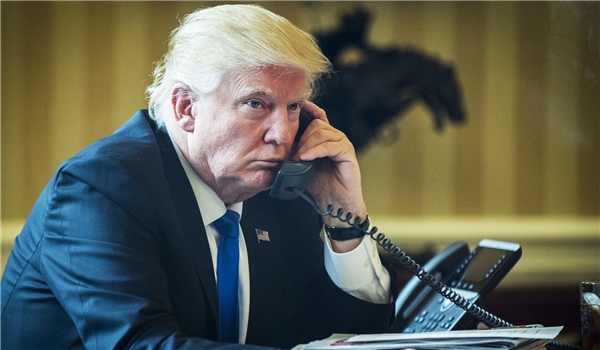May 17, 2019

President Trump has launched a new effort to open talks with the Islamic Republic, announcing that he is waiting for someone from Iran to make a telephone call to the White House.
This appears to be a replay of Trump’s approach with North Korea, at which he threw military threats for months but then sat down for talks with its leader, whom he now smothers with loving rhetoric. But the bottom line is that the effort with North Korea has gone nowhere.
A few weeks ago, Trump proclaimed a strategy of “maximum pressure” on Iran to make it cooperate. Then he proclaimed the Pasdaran “terrorist,” sent bombers and other military assets to Iran’s borders (see story above), created new sanctions on the country’s metals industry, and ended waivers that allowed several countries to buy Iranian oil (see story on top of this page).
But on May 9, Trump shifted gears.
“What I would like to see with Iran, I would like to see them call me,” he told reporters at the White House. What they should be doing is calling me up, sitting down. We can make a deal, a fair deal. We just don’t want them to have nuclear weapons—not too much to ask. And we would help put them back to great shape.”
He repeated, “They should call. If they do, we’re open to talk to them.”
This sounded like a duplicate of his offer to North Korea: Change your hostile policies and America will help you become rich.
This, however, ignored the view of most specialists that Iran and North Korea aren’t richer primarily because of their own governments’ economic policies.
It also ignored the fact that Supreme Leader Ali Khamenehi has repeatedly forbidden any talks with the United States, saying it cannot be trusted to keep its promises, as evidenced by the fact that Trump reneged on what President Obama promised when Trump dumped the nuclear agreement.
As Iran’s ambassador to the UN, Majid Takht-Ravanchi, told MSNBC, “What is the guarantee that he will not renege again?”
But Trump seemed to think he had driven Iran to the wall with his strategy. With considerable exaggeration, Trump said: “Their economy is a mess ever since I took away the Iran deal. They have inflation that’s the highest number I’ve ever heard. They’re having riots every weekend—and during the week even.”
CNN reported that hours after Trump spoke the White House even went to so far as to give the Swiss embassy in Tehran a telephone number the Iranian government could use to reach Trump. Iran said it would not call.
In an interview with CNBC two days later, Secretary of State Mike Pompeo stressed that the US isn’t looking for a fight — and won’t stumble into one either.
“We’re not going to miscalculate: Our aim is not war, our aim is a change in the behavior of the Iranian leadership. We hope the Iranian people will get what they finally want, and what they so richly deserve,” he said.
The secretary of state offered little guidance on what course the White House is likely to pursue in the event of an altercation with Tehran, but he emphasized that Washington would not sit idle.
“An attack on American interests from an Iranian-led force, whether it’s an Iranian proper or it’s an entity that is controlled by the Iranians, we will hold the responsible party accountable. President Trump has been very clear about that: Our response will be appropriate.”
The term “appropriate response” is the Trump Administration version of “all options are on the table,” which was used by the Clinton, Bush II and Obama Administrations to sound tough while avoiding making any direct threat of the use of military force. The “all-options” language never scared Tehran; the Trump Administration has never explained why it thinks its “appropriate response” language will have a different impact.
Trump mentioned only Iran’s nuclear program as a concern, which was odd given that he damned the Obama nuclear agreement because it only dealt with Iran’s nuclear program and not other Iranian policies.
Pompeo didn’t make that error. “Iran is the major destabilizing influence in the Middle East, and we aim to fix that,” Pompeo said in his CNBC interview, pointing to Tehran’s role in terrorism, the flow of weapons into neighboring countries, and “a radical increase in Iranian-supported entities.”
The Islamic Republic says Trump hates not just the Iranian government but the Iranian people, and is hurting them with his sanctions.
Pompeo argued, however, that the United States is targeting only the country’s rulers. “These sanctions are directed at the Iranian leadership to change their behavior — point blank, point blank,” he said. “The Iranian leadership understands the cost that is being imposed. This is a kleptocratic regime that has stolen billions of dollars and wastes the Iranian people’s own money on these proxy wars all across the world.”
“The Iranian government, while its people are suffering, according to them, is spending money in Venezuela. They’re sending forces to Venezuela,” he added. “This is not a leadership that reflects what the Iranian people want.”
Pompeo has said several times that the Lebanese Hezb-ollah, a proxy of the Iranian government, operates in Venezuela.
Despite the open antagonism between Washington and Tehran, Pompeo nevertheless repeated that the White House would be happy to receive overtures from Iran to sort out their differences.
“Of course, we would welcome that call. Of course, we want a peaceful diplomatic resolution to each of these conflicts that we’ve talked about here today,” he told CNBC. “That makes perfect sense.”